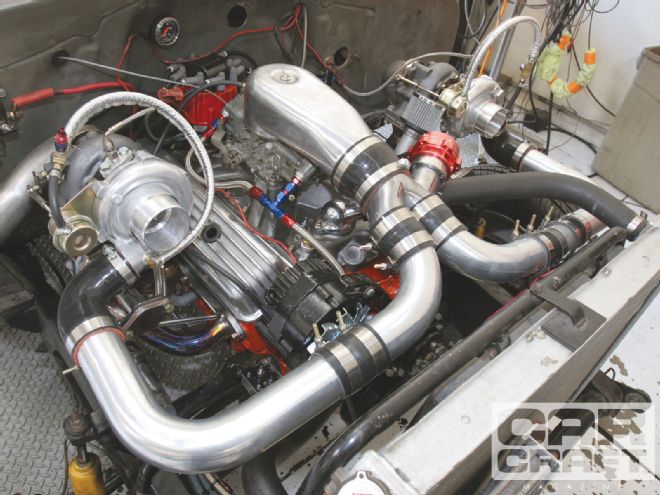
Have you heard the legend about making 1,000 hp for $1,000 using eBay turbos? It's true. Well, parts of it are. We were able to buy a complete twin-turbo system that will bolt on to your near-stock small-block Chevy for very little cash and make more than 600 rwhp. The problems lie in getting it to fit in your engine compartment and watching the tune-up so you don't scatter the parts.
When we hatched this scheme, we wanted to know the truth about the lowdown $150 turbo. At Car Craft, we don't listen to speculation-we blow up parts ourselves so you don't have to. The following is a firsthand, actual test and fitment of the cheapest of eBay turbos. Since there are many variations of manifolds, turbos, and accessories, we tried to select parts that represented the average you can buy every day. Using an eBay gift certificate, we bought turbos, headers, piping, and all the other ancillary parts, and with the help of Ted Toki, George Diagne, and Eric Solomon at Westside Performance in West Los Angeles, California, we installed it on Toki's '55 Chevy for some testing. At the end of it all, we discovered that this is far from the best system you can buy, but it is a great way to get involved in the stupid power of a turbo system. When you do this, be sure to have fun and expect to make something explode in the name of science. We did.
The Car
You might have seen Toki's original '55 Chevy Gasser before. We used it to test a partial-fill 406-inch small-block we built using a cheap stroker crank and a 350 block ("Sleeper Small-Block Combo," Aug. '09). We drove it around The Valley to test the theory that a HardBlok engine on the street would kill all bystanders in an atomic mushroom cloud of boiling coolant. It didn't even ping. After that stellar performance, we decided to push our luck with the turbo scheme. We also like that the front end can be tilted or removed for quick engine swaps (two hours or less), and Toki has no problems with burnouts or door dings. Jealous? We are, too.
The Mill
The engine in the '55 is a basic 0.030- over iron small-block with 9.0:1-compression forged Probe pistons and an Engle EP22 cam with 0.480/ 0.480 lift and 230 degrees of duration at 0.050 on a 110 LSA. The heads are a set of factory iron 882 castings fitted with a set of 2.02/1.60 valves and treated to a little bowl and short-side work. The manifold is a used Edelbrock Torker single-plane with a Holley 850 double-pumper. We've heard you don't need crazy parts to make power with a turbo because of the relatively gentle application of cylinder pressure compared with nitrous or big static compression engines, so we wanted to use the simplest combo we could. The small-block makes about 350 hp and can be found in just about any car guy's garage.
The Turbos
There were several new and used turbos on eBay when we went shopping. We skipped the used junk altogether and went straight for the lowest cost new unit we could find. That turned out to be the infamous T3/T4 hybrid. It has a T3-style flange attached to the 0.58 A/R ratio turbine with a 2.5-inch V-band outlet. On the cold side, it has a T04B housing and a 56 trim wheel. What that all means is they spin up hard because of their small size but ultimately create a lot of heat and backpressure. Larger, more expensive turbos, of course, would be better.
There are external wastegate versions available, but that added the cost of two wastegates to the total, and we wanted to spend as little money as possible. This is the same reason we didn't buy an intercooler. They're good-we just didn't want to spend the cash. We're going to tell you up front that the external wastegate design is a lot better. More on that later.
The Manifolds
The exhaust manifolds were only $99.90. They used all the parts that were advertised, such as a 1/2-inch flange and mandrel bends, were made of stainless steel, and included gaskets and hardware. That is the upside. The downside is the generic design. The primary tubes neck down into a 2.5-inch collector before the flange, and the wastegate port is small and mounted at an inefficient 90-degree angle to the exhaust flow. On the '55, Toki had to move the master cylinder to a floor design to clear the turbine housing. We're thinking it might fit a Chevelle that still uses the factory jam-jar nonpower brakes, but don't plan on installing these manifolds on your Corvette. For $99, it's worth trying on anything. You can always cut and paste as needed.
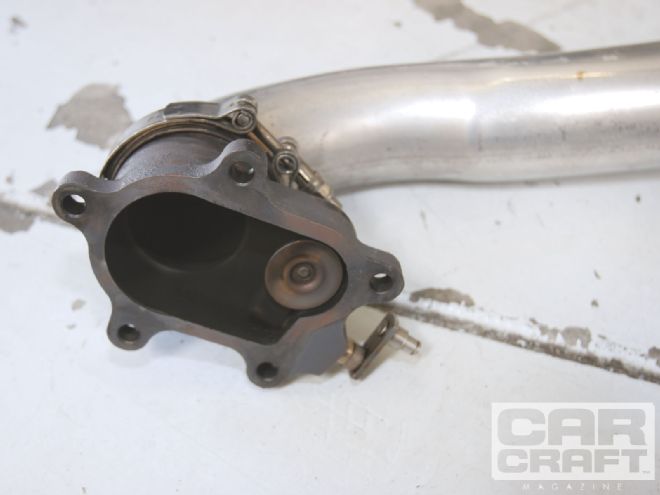 Here is the wastegate as seen from the exhaust side. Note the small size of the door on the right that is connected to the actuator pushrod. All the boost needs to exit through this small port. Didn't happen.
Here is the wastegate as seen from the exhaust side. Note the small size of the door on the right that is connected to the actuator pushrod. All the boost needs to exit through this small port. Didn't happen.
Carb
Eric Solomon at Westside only did a couple of things to the Holley 850 double-pumper to get it ready. First, he swapped the brass floats for nitrophyl so the boost pressure wouldn't crush them. The next step was to mill off the choke horn and epoxy the small oval-shaped hole that feeds the choke rod to the top of the carburetor. The last step was to drill out the power valve channel restrictors on the carburetor. He used the large vacuum port at the back of the carburetor to operate the blow-off valve and left everything else alone. The fuel curve was stable at the power levels we saw in the test.
The Baseline 437 RWHP/489 LB-FT
We've stated previously that the small internal wastegates aren't capable of venting enough boost and subsequently risk overboosting the engine. After several safety runs to get the carb jetting and timing set, we made a full pass. The turbos began to make boost at 3,000 rpm and kept climbing to a maximum of 16 pounds. The '55 made 437 rwhp at 5,000 and 489 lb-ft at 4,500 rpm.
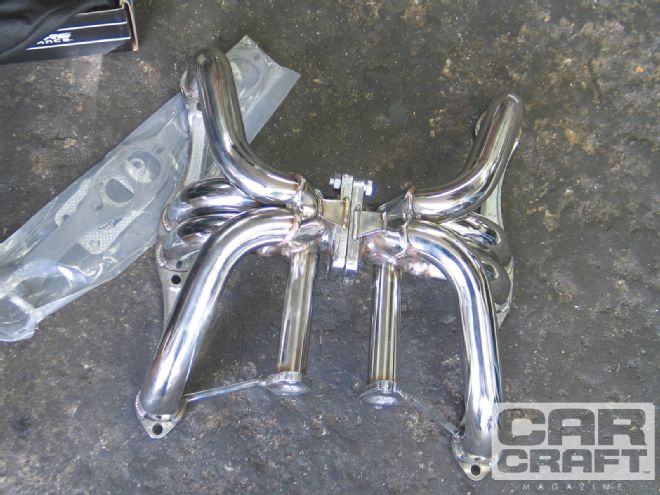 The headers weren't designed to fit any particular car, so you are going to need a trial fit. The 90-degree turn from the collector to the wastegate tube and the small cross-sectional area where the collector meets the T3 flange are both bad for airflow. The good news: the thick flanges, plenty of reinforcement braces, and a low, low price.
The headers weren't designed to fit any particular car, so you are going to need a trial fit. The 90-degree turn from the collector to the wastegate tube and the small cross-sectional area where the collector meets the T3 flange are both bad for airflow. The good news: the thick flanges, plenty of reinforcement braces, and a low, low price.
Those boost numbers may seem like a good thing, but they're not. Too much boost forces the boost-referenced regulator to add equal amounts of fuel pressure, stressing the system. It also required us to back down the timing to 18 degrees total, a move that kills power and driveability completely. That much boost without enough fuel to feed it and not enough octane to prevent detonation is the fast way to blowing up everything.
Another problem with an inadequate wastegate is the overspeeding of the turbo itself. We're going to argue that buying inexpensive turbos and spinning them to their maximum speed is asking for trouble. Since the untouched baseline for these turbos spins them hard, we're going to say that part of the reputation for flying parts and flameouts comes from too much rpm, so the first thing we did was slow them down and keep the engine below 6,000 rpm.
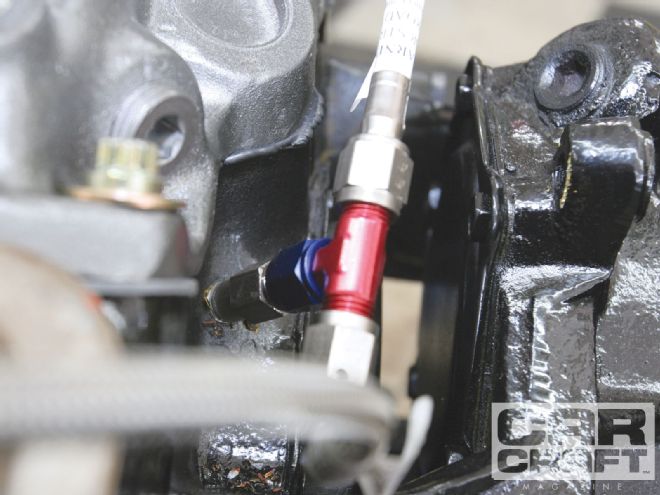 The floating-bush journal bearing in the turbo is cooled and lubricated with engine oil. On the small-block Chevy, there are two, sometimes three options. Solomon used a gallery port behind the water pump with a T to feed both turbos pressurized oil. You can also use the port at the rear of the block or by the oil filter.
The floating-bush journal bearing in the turbo is cooled and lubricated with engine oil. On the small-block Chevy, there are two, sometimes three options. Solomon used a gallery port behind the water pump with a T to feed both turbos pressurized oil. You can also use the port at the rear of the block or by the oil filter.
Sadly, if you look at this in terms of the system as a whole and the ultra cheapness of the parts, it was a failure. The only way to make this base system work is to run race gas and virtually no timing and risk overspinning the turbos and destroying the engine. The combo is also going to create a lot of exhaust temperature and crappy driveability.
Wastegates 442 RWHP/445 LB-FT
The fix cost us $600 for a pair of good wastegates. We wired the integral wastegates closed and added a pair of TurboSmart Ultra-Gate 58 wastegates to control the boost. We were looking for 6 to 8 pounds from the turbos, so Marty Staggs from TurboSmart USA supplied a 7-pound spring. On the next run, we were able to add 5 degrees of timing to a conservative 23 degrees, and we saw a decrease in boost to about 10 pounds, allowing us to run the engine to 5,800 rpm. We made almost the same power with less boost. The relatively small size of the wastegate tube and the way it was welded perpendicular to the exhaust primary still prevented us from properly venting all the boost. The 2.5-inch exhaust pipe from the back of the turbine also was too small, causing backpressure that was holding the wastegate valve closed.
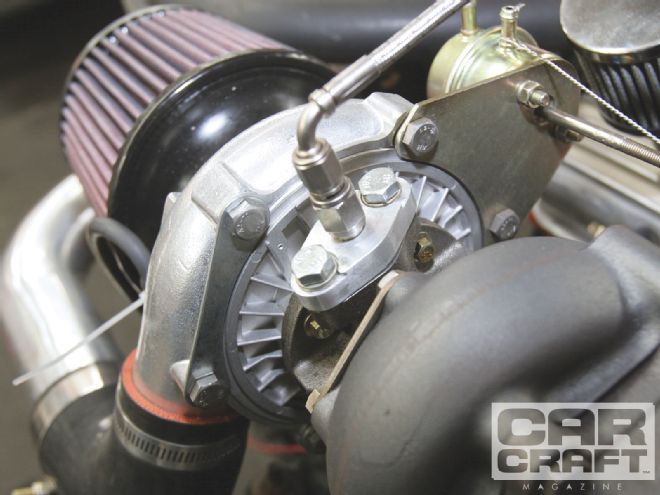 This is the oil inlet side that feeds the bearing. More expensive turbos use a ball bearing for longer life and better performance.
This is the oil inlet side that feeds the bearing. More expensive turbos use a ball bearing for longer life and better performance.
Boost Controller 493 RWHP/515 LB-FT
Now that we had a little more control, we decided to find the limits of the setup using 91-octane pump gas and a dial-in wastegate controller. The device simply creates a metered vacuum leak in the actuator signal, slowing down the opening of the gate or cracking it earlier in the rpm range. This netted us the best number of the day, using a maximum of 13 pounds of boost and 23 degrees of timing. But we wanted more.
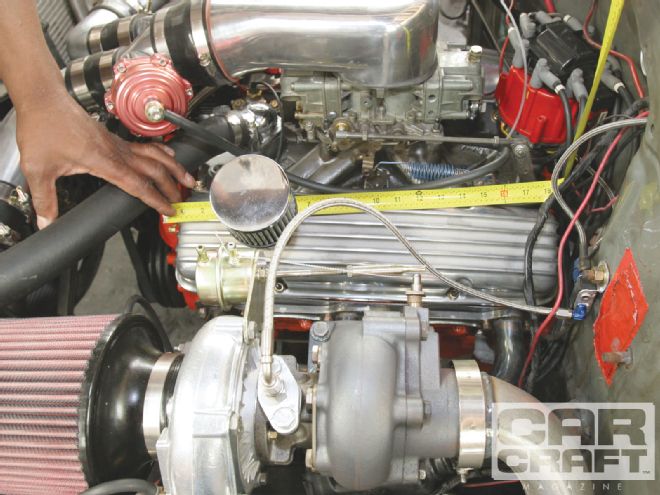 The turbos sit midway along the length of the valve cover. This photo is to simply illustrate where you might have fitment problems.
The turbos sit midway along the length of the valve cover. This photo is to simply illustrate where you might have fitment problems.
High-Octane 596 RWHP/642 LB-FT
The enemy of the engine is boost combined with detonation. Up until this point, we were listening closely and watching for signs that appear as pepper in the plug's porcelain. The last run showed signs of both. To prevent problems, we added Rockett Brand 114-octane fuel before we twisted a handful of boost dial. The result was a scary 22 pounds of boost and a whopper torque number for a cast-crank, iron-head 355. The Fear also forced us to abort the run at 4,800 rpm when we saw all the numbers were still climbing rapidly.
Next Time
We didn't care how much power we were going to make. We simply set out to see what you get for your dollars with an eBay turbo kit. If anything, we were impressed by nearly 600 rwhp and the crank-snapping 642 lb-ft, and you should be, too. We learned that you shouldn't buy the turbos with the integral wastegates; buy the external gates instead. If you are going to run this on the street, get an MSD BTM controller that retards the timing as the system sees boost so you can run some initial on the street.
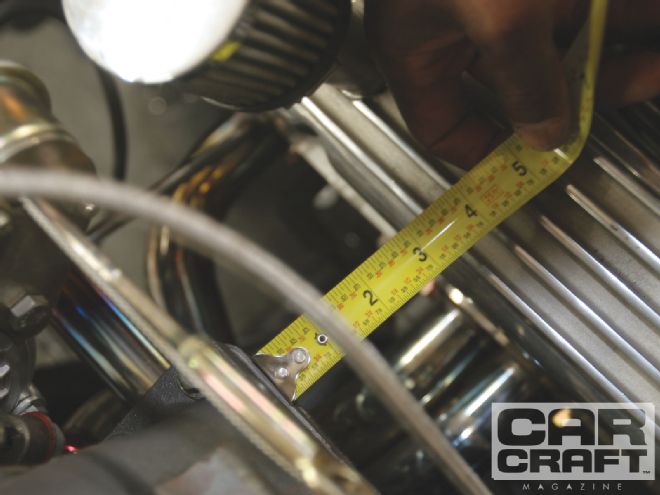 The T3 flange sits about 3 inches outboard from the valve cover.
The T3 flange sits about 3 inches outboard from the valve cover.
The next steps for the '55 are a larger-diameter exhaust pipe to kill some of the backpressure, an intercooler, and a set of upgraded turbos to give us a cooler charge with less of a chance of grenading parts due to overspeeding. It will also give us more power, which is always a good thing.
Who You Gonna Call?
What you are going to get is . . . erm . . . what you are going to get. The reason reputable companies such as Turbonetics and Precision and smaller outfits such as Hellion and Wrenchrat get a little bit more money for their products is because they want their parts to last a long time and make you happy. They also don't want a mob of angry customers at the door. On the other hand, the address for our turbo was in the middle of the L.A. River and the phone number was 888/321-1234. They might not be so concerned with customer service. Caveat emptor, dude.
PARTS LIST
DESCRIPTION
SOURCE
PRICE
-10 AN oil drain-back flange (2)
eBay
$19.90
2.0 to 2.5 90-degree intercooler intake silicone (2)
eBay
39.90
2.5-inch straight intercooler silicone coupler kit (2)
eBay
59.90
3.5 to 4.0 turbo intake reducer silicone coupler
eBay
19.95
3-inch V-band flange kit (2)
eBay
49.98
50mm blow-off valve
eBay
75.00
Nissan Sentra 92 to 95, 2.5-inch intercooler piping
eBay
61.00
T3/T4 hybrid turbocharger (2)
eBay
298.00
Twin-turbo exhaust manifold
eBay
99.00
T-bolt clamps (14)
eBay
42.00
Blue fuel pump
Holley
131.95
Boost-referenced regulator PN30-1803
Quick Fuel
75.00
-10 AN oil drain-back fitting (2)
Summit Racing
49.90
-10 bulkhead fitting (2)
Summit Racing
29.90
Spectre Universal modular air intake plenum
Summit Racing
75.00
ACCEL 276 spark plugs (8)
Summit Racing
23.60
-3 oil feed (brake) lines (2)
Westside
50.00
-4 threaded oil feed flange (2)
Westside
34.00
-4 oil feed coupler (2)
Westside
10.00
4 feet of -10 AN line
Westside
48.00
Base System Cost
1,291.98
Ultra Gate 38 wastegates (2)
TurboSmart
599.98
Boost controller
TurboSmart
89.99
Total System Cost
1981.95